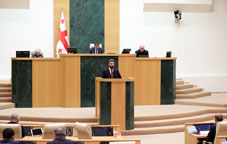
Parliament Approves Bill Restricting Political Rights of Individuals Linked to Banned Parties
By Liza Mchedlidze
Friday, October 17, 2025
The Georgian Dream parliament majority has approved, in its final reading, a sweeping set of legislative amendments that restrict political rights for individuals "associated" with parties deemed unconstitutional. The measures bar such individuals from joining or forming political parties, running for elected office, or holding positions in government and constitutional bodies.
The new legislation expands the scope of Article 23 of the Law on the Constitutional Court of Georgia, which already allows the Court to annul the registration of a political party whose establishment or activities are declared unconstitutional. Under the amendments, these restrictions now extend to individuals "associated with" such parties, effectively disqualifying them from a wide range of political participation.
Those affected would be prohibited from founding, leading, or joining a political party; serving in its executive or supervisory organs; or holding state-political or political office. The law also allows for the termination of parliamentary or local mandates and removal from electoral lists at the request of a plaintiff in a constitutional case.
Additional changes to the Criminal Code introduce fines for parties that fail to comply with Constitutional Court rulings or that obstruct enforcement of bans on affected individuals. Related amendments to the Law on Citizens' Political Associations and Georgia's Electoral Code empower authorities to deny registration to parties including such individuals as leaders or members, bar them from running in elections, and revoke party lists containing their names. The legislation also forbids these individuals from making political donations.
The package follows a May law that granted the Constitutional Court authority to ban political organizations whose leadership, goals, or activities are considered identical to those of an already-banned party. That measure allows the Court to outlaw groups deemed to advocate violent change of the constitutional order, undermine state independence, promote war or violence, or incite ethnic, religious, or social hatred.
The ruling party has made no secret of its intention to use the new framework to pursue bans against opposition forces. Georgian Dream leaders have repeatedly said they will appeal to the Constitutional Court to outlaw the United National Movement (UNM), the former ruling party, and other opposition groups the government refers to collectively as the "collective UNM."
Prime Minister Irakli Kobakhidze said in an interview with Georgia's Public Broadcaster on October 15 that the forthcoming appeal would target "up to ten parties, including smaller ones." He explained that anyone who had "been continuously involved in sabotage against the state together with this bloody party or force" would be affected, adding that the full list would be released "in a couple of days."
Presenting the bill in parliament, Georgian Dream MP Mamuka Gorduladze said the bans would not only apply to formal party members. "These are members, representatives of the ruling circle, or they could just as well not be party representatives, not have party tickets in their pockets, but through their activities be fully aligned with the party's goals or ensure that the party's politics are put into practice," Gorduladze stated.
The Georgian Young Lawyers' Association (GYLA) warned that the measures risk inflicting "significant democratic erosion." The group said the amendments blur the line between protecting democracy and suppressing pluralism, arguing that they "disproportionately and indefinitely limit individual rights" and could, in the long term, "lead to the disappearance of the political spectrum."
The Georgian Dream party has defended the new laws as necessary to protect the constitutional order. Critics, however, see them as the latest in a series of moves to consolidate power and eliminate meaningful opposition ahead of future elections.

